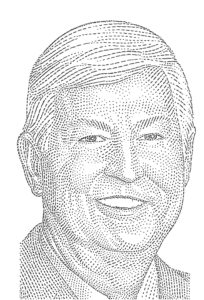Lessons From Rick Hill: My First Job as a Stockbroker—1967

My excitement about investing led me to pursue a role as a stockbroker in Philadelphia right after I completed my MBA. Back in the late 1960s, almost no one bought mutual funds. As a broker, I made recommendations to my clients about which stocks to buy. Then, the trend was to bet big on the next ‘winner’ – not too dissimilar from today’s speculation around cryptocurrency.
As a young broker, I had worked hard to save $3,000. I was ready to invest my money the same way I invested my client’s money. I looked over the recommended stocks list, researched, and narrowed my options down to two companies. One was a mobile home company, and the other was an airline that delivered oil drilling equipment to Alaska’s north slope.
Both stocks were selling at $30 a share. With my $3,000, I could buy a full lot (100 shares) of either one. The airline stock had a more exciting story, so I bought that one.
I watched both stocks closely over the next several months. Unfortunately, the airline stock took a severe nosedive, falling to $3 a share, a whopping 90% loss, while the mobile home stock doubled to $60 a share. After many agonizing days, weeks, and months, I sold my airline investment for $300, suffering a loss of $2,700.
With my annual salary of $9,000, my finances took a significant hit. I just blew up my nest egg! I kicked myself for not buying the mobile home stock and earning $6,000 – a net difference of $5,700! That much money could have changed my life. I could have bought a nice car, taken a European vacation, or used the money for other exciting adventures. Regret reigned supreme. Mainly I questioned why I didn’t split my investment by buying 50 shares of each company – at least then I would have spread out my risk.
Lesson Learned: Diversification can help you get better results with less stress.
Diversification is a way to spread your risk, increasing the chances of your exposure to potential winners; a way to own the haystack rather than searching for the needles. Also, different countries and sectors perform differently at different times – it’s almost impossible to predict when each will have its day in the sun. If you are deeply diversified, you increase your chance of owning the winners, and at the right time.
Back then, I would have told you I was investing. With the wisdom that comes with age, I now know that I was gambling. Why? I put all my eggs in one basket by betting on one company. Also, even though the insight helped me learn my lesson, I would never call buying two stocks proper diversification. Today, our clients have access to expertly-designed mutual funds that make it easy to own around 13,000 stocks from around the globe. A strategy that is much better than betting on one airline!
I was lucky to learn early on that – both financially and emotionally – diversification deserves a key place in any long-term investment strategy. No one can accurately predict which investments will win and which will lose, and take it from me, you can drive yourself crazy watching to see whether your bets are going to pay off.
Don’t want to wait for the next lesson, set up a time to talk here.


